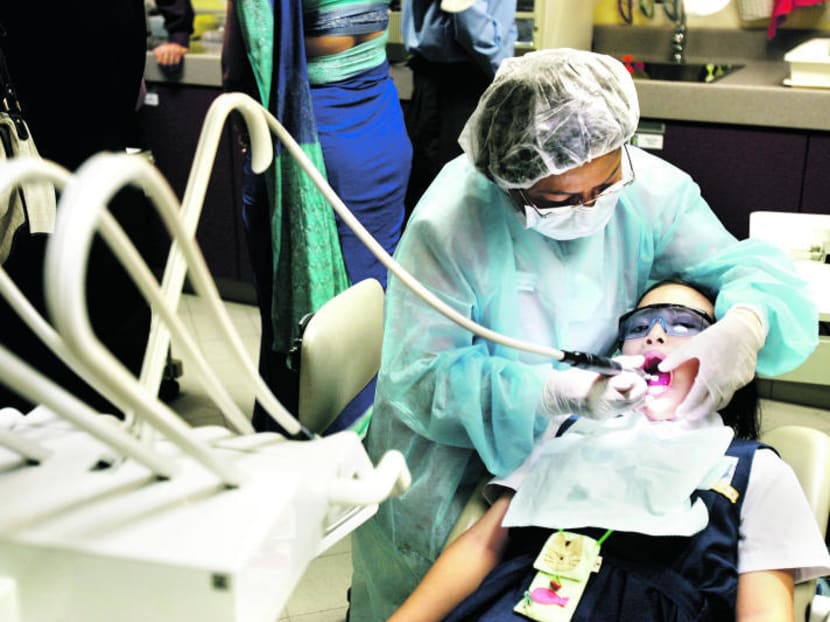The tooth’s out: Dental health an overlooked area in diabetes care
SINGAPORE — People with diabetes are more likely to get gum disease. However, oral health remains an overlooked area in diabetes care due to greater emphasis placed on other diabetes-related health complications.

Oral health remains an overlooked area in diabetes care due to greater emphasis placed on other diabetes-related health complications. TODAY File Photo
SINGAPORE — The first question Ms Sandra Lim’s (not her real name) gum specialist asked after seeing her badly-infected gums and getting a whiff of her bad breath was whether she has diabetes.
Tests later revealed she had pre-diabetes, or higher-than-normal blood sugar levels. By then, Ms Lim had already lost three teeth due to severe gum disease although she was only in her 30s.
People with diabetes are more likely to get gum disease – also called periodontal disease – a chronic bacterial infection of the supporting structures of the tooth. The condition is likely to be more severe than in non-diabetics, said Dr Kevin Tan, vice-president of the Diabetic Society of Singapore.
However, oral health remains an overlooked area in diabetes care due to greater emphasis placed on other diabetes-related health complications, said periodontist Ang Chee Wan, clinical director of T32 Specialist Division.
With diabetes incidence on the rise here, affecting one in nine Singaporeans and with one in three Singaporeans having a lifetime risk of getting the chronic disease, dentists are seeing a growing group of patients like Ms Lim. Dr Ang estimated about five to 10 per cent of gum disease patients he sees in his practice have diabetes.
“Most non-diabetic patients suffer from gum disease because of their inability to maintain good oral hygiene. They tend to be older adults. However, those with diabetes present with severe or advanced gum disease despite relatively good oral hygiene and are generally younger,” said Dr Ang.
Dr Chang Kok Meng, president of the Society of Periodontology (Singapore), has seen diabetic patients with receding gums or pus leaking from infected gums. In extreme cases, all of the patient’s teeth may fall out because the gums have rotted to the point where they can no longer support the teeth.
“Diabetes affects healing, response to infection and metabolism. When a person with diabetes has gum disease, he will not be able to respond as well to the infection,” said Dr Chang at a public forum organised by the Diabetic Society of Singapore earlier this month.
It is estimated that 40 per cent of adult diabetics in Singapore have moderately-advanced gum disease, compared to 15 per cent of the average population, according to a Singapore study published in the Singapore Dental Journal in 2003.
In the advanced stages, known as periodontitis, the infected gums and supporting bone structures rot away and patients experience irreversible multiple tooth loss.
“As our population ages and we live longer, the impact of having poor dentition becomes more pronounced. You can’t live well if you can’t eat well,’ said Dr Chang.
SCREEN GUM DISEASE PATIENTS FOR DIABETES?
Some experts have proposed routine screening of patients with severe gum disease for diabetes.
In a new study on 313 people published in the BMJ medical journal in March, pre-diabetes was found in almost half of those with gum disease. Screening could be an effective preventive measure for high-risk patients, said the team from the University of Amsterdam in The Netherlands.
Emerging evidence suggests the relationship between the two conditions goes both ways. Chronic gum inflammation may raise the body’s pro-inflammatory cytokines, which could worsen insulin resistance and contribute to one’s risk of developing diabetes.
It may also make it harder for diabetics to control their condition, which can lead to other diabetes-related complications, according to the American Academy of Periodontology.
When Mr Jimmie Lee, who has Type 2 diabetes, showed up for his dental check-up with worsening gum disease and five shaky teeth, his periodontist Dr Ang suspected that his chronic condition was not well-managed.
Dr Ang’s hunch was right. The 58-year-old retiree was referred to see an endocrinologist who assessed that his diabetes was out of control.
“I knew that (diabetes) could lead to other health issues but was surprised to learn that gum disease was one of them. Now that I am managing my diabetes better through specialist care, I can feel the difference (in my gum health) like being able to chew better and bite into an apple without leaving bloodstains,” said Mr Lee.
While more research is required, Dr Tan said oral health should form an integral part of diabetes management. Dental care in Singapore is presently not subsidised or Medisave-claimable based on the patient’s diabetes status, said Dr Ang.
“To win our war against diabetes, it is very important to help Singaporeans with diabetes get adequate dental care,” said Dr Ang.
Gum disease is preventable and treatable in the early stages, said the experts.
“The deterioration can take place over years so it is easy to miss the early warning signs like persistent gum bleeding and swelling. My recommendation is for everyone to undergo regular dental checks to pick up any problems early,” said Dr Chang.
People with diabetes may require more frequent dental check-ups and cleaning – every three to four months for example, to keep gum disease at bay, said Dr Ang.
He also advised diabetics to inform the dentist of their medical condition as it may affect certain dental treatments and medications prescribed by the dentist.






